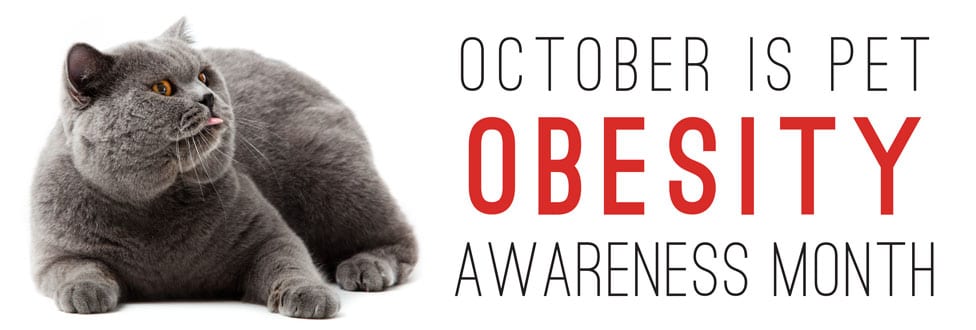October is Pet Obesity Awareness Month at BVC
As humans, we’re reminded daily about the short and long-term health benefits of proper nutrition and exercise. To keep our weight in check, we can pretty easily monitor our weight loss or gain by stepping on our bathroom scale, trying on those “skinny jeans”, or observing our overall energy level. And, if we don’t like what we see or how we feel, we can make a conscious effort to get our health back on track.
When it comes to our pets, the same rules about a proper diet and maintaining a healthy weight apply, except that our pets cannot regulate it themselves; we must do it for them!
According to the Association for Pet Obesity Prevention, an estimated 52.6% of dogs and 57.6% of cats in the United States are overweight or obese. These statistics are concerning since there are many health risks for overweight pets, which include: diabetes, joint stress, arthritis, an increase in blood pressure, heart disease, lethargy, and overall poor quality of life. These worrisome negative health implications are why obesity in our pets is not only important to recognize, but also to control and prevent.
Boston Veterinary Care (BVC) shares 5 important tips on how to manage your pet’s weight:
- Keep track of your pet’s weight, just as you would your own, so that any gains or losses can be easily detected. A 5-pound weight gain may not have a significant effect on a 160lb human, but it will on a 15lb dog. To determine if your pet may be overweight, stand directly over your pet and look down at them; if you do not see a waistline, then your pet may be too heavy.
- Monitor your pet’s eating habits. This includes snacks too! Proper calorie intake varies by animal, so consult your veterinarian to determine your pet’s ideal weight and a proper diet. If your pet seems hungrier than normal after mealtime, try to figure out if their eagerness to eat is from actual hunger or simply the desire to taste those yummy table scraps.
- Observe any changes in energy level. If your pet seems to be tired or less active than normal, weight gain or improper nutrition may be to blame. If the lethargy lasts more than a few days, contact your veterinarian.
- Create a lifestyle that encourages exercise. Most pets like to play, so find an activity that you both enjoy. If your dog likes to run, try jogging with them a few times a week. If they like to fetch, throw a ball around with them in the park after work. If you have a cat, find a toy that they like to chase. Remember, you’ll reap the benefits of the daily exercise too without even realizing it!
- Schedule vet appointments regularly. In addition to your pet’s annual wellness exam, you should take your pet to their veterinarian if you observe any significant weight gain (or loss!), or a change in eating habits or energy level. If your veterinarian determines that your pet needs to lose a few pounds, it’s important to help them slim down to a healthy weight- and to help them maintain it afterward.
To make an appointment at Boston Veterinary care, call617-226-5605 or email bvc@arlboston.org.

